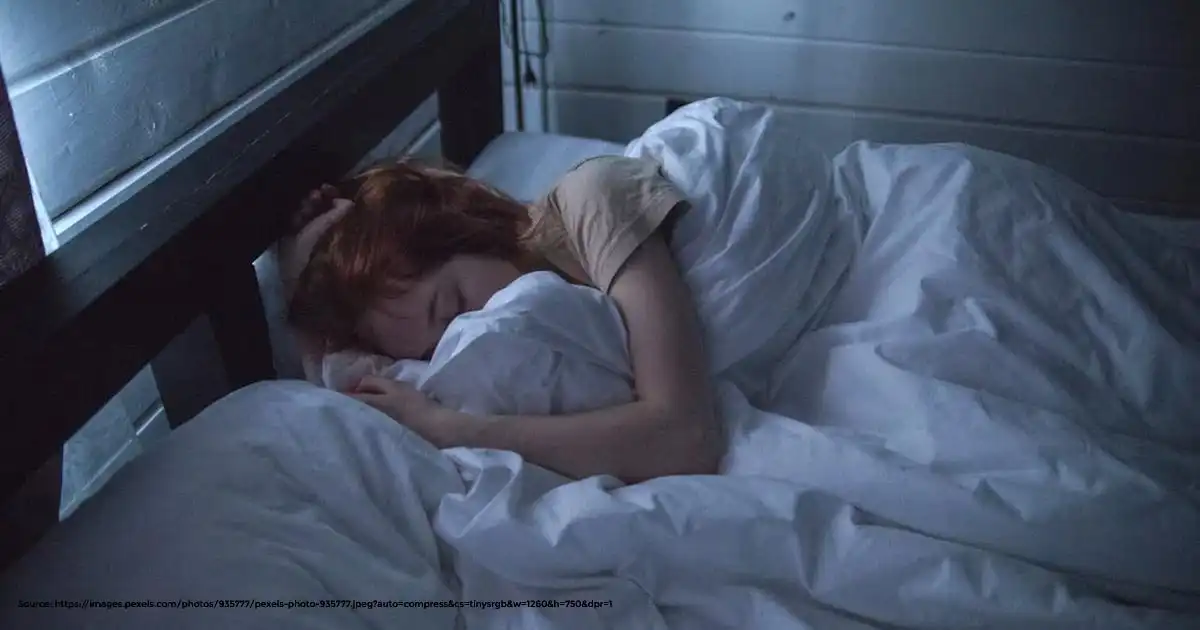What Is Somniphobia (Fear of Sleep)? Is There A Better Cure?

Do you dread the thought of going to bed? Are you feeling anxious or panicked when you try to fall asleep?
Or you try and avoid sleeping?
If you answered yes to any of these questions, you might have somniphobia, or the fear of sleep.
Somniphobia is a type of phobia. It relates to an irrational fear of sleep which may be interrelated to certain objects or situations. People with somniphobia experience intense anxiety and distress when they think about sleeping or when they attempt to sleep. This can interfere with their daily functioning, health, and well-being.
Here in this article I will discuss every little pointer that you need to look up for somniphobia. We will detail upon – symptoms, causes, trigger-points, diagnosis and treatment.
By the end, you will gain clarity on somniphobia and understand how to overcome it. You will also learn how to sleep better and enjoy the benefits of a good night’s rest. So, why wait further; let’s start!
Why Am I So Scared of Sleeping?
Somnophobia means being scared of falling asleep. Even though some people may try to avoid this fear, sleep is crucial for our health. Insufficient sleep and irregularity in sleeping patterns on a prolonged basis can lead to problems like obesity, diabetes, and heart disease. Feeling extremely scared or anxious about sleep can harm your overall health.
Here we arrive at a potentially important question…as discussed below.
“Is Somniphobia Dangerous?”
Being afraid of sleep (somniphobia) can be dangerous. Sleep is super important for our health – it helps our immune system, mood, and learning. Not getting enough sleep regularly can cause health problems like obesity and diabetes. Somniphobia may also make us anxious or sad, affect our work and relationships, and even lead to accidents. So, it’s important to take somniphobia seriously and seek help if needed.
Are Children Affected by Somniphobia?

Somniphobia, or fear of sleep, can impact children similarly to adults. Various factors can contribute to the development of somniphobia in children, such as experiencing other sleep disorders, anxiety issues, PTSD, or having a family history of anxiety and sleep disorders.
It’s also worth noting that somniphobia tends to be more prevalent among girls and children.
Signs that a child may be struggling with somniphobia include strong resistance to bedtime, frequent crying or tantrums around bedtime, difficulty sleeping alone, and frequent awakenings during the night.
If you notice these signs in your child, it’s essential to consult with a pediatrician. They can provide guidance on managing somniphobia and address any underlying issues contributing to the fear of sleep. Early intervention and appropriate support can help alleviate the child’s anxiety and improve their overall sleep quality.
Does your child experience a fear of sleeping because of nightmares? Read more.
What Are The Symptoms of Somniphobia?
How do you identify whether you or your near ones are affected by somniphobia? For early identification and immediate diagnosis, we have researched on common symptoms of the phobia. Have a look at it:
10 Most Common Symptoms of Somniphobia
- Profuse Sweating:Experiencing excessive sweating, especially when thinking about or attempting to sleep, is a common symptom of somniphobia.
- Rapid Heartbeat:Individuals with somniphobia may have a fast heartbeat, particularly during situations related to sleep, like bedtime.
- Shortness of Breath:Feeling breathless or having difficulty breathing is another symptom, especially when the thought of sleep arises.
- Panic or Fear:A sense of intense panic or fear is common when contemplating sleep or actually trying to sleep. Some may even experience this reaction in situations representing sleep, like being around mattresses.
- Trembling:Physical trembling or shaking may occur as a response to the fear associated with sleep or bedtime.
- Desire to Avoid Sleep:People with somniphobia may strongly wish to avoid sleeping altogether, leading to disrupted sleep patterns and a reluctance to engage in bedtime routines.
- Constantly Thinking About Sleep: Persistent thoughts about sleep dominate the mind, making it challenging to focus on other activities.
- Difficulty Concentrating:Worrying about sleep can make it difficult to concentrate on daily tasks, affecting overall productivity and focus.
- Mood Changes:Somniphobia may contribute to mood swings, as the fear of sleep influences emotional well-being.
- Physical Symptoms of Panic: Physical manifestations of panic, such as sweating, labored breathing, a racing heartbeat, and nausea, are associated with somniphobia.
Long-Term Effects of Somniphobia
- Anxiety and Depression: Somniphobia may contribute to the development or exacerbation of anxiety and depression over time.
- Psychological Distress: Persistent fear of sleep can lead to ongoing psychological distress, impacting mental well-being.
- Substance Abuse: Coping mechanisms, such as substance use, may develop as individuals attempt to manage the anxiety associated with somniphobia.
- Stress: Chronic stress is a potential long-term effect, as the fear of sleep continues to influence daily life.
- Social Isolation: Avoidance of sleep-related situations may contribute to social isolation, affecting relationships and interactions with others.
- Relationship Issues: The fear of sleep can strain relationships, particularly when it interferes with shared bedtime routines or causes disruptions.
- Reduced Quality of Life: Untreated somniphobia can significantly reduce overall quality of life, affecting various aspects of daily functioning.
- Predictive of Other Mental Health Conditions: Somniphobia may predict the development of other mental health conditions, emphasizing the importance of seeking timely intervention and treatment.
Causes of the Phobia
Well, take a look at the causes of somniphobia.
- Genetic Reasons & Environmental Factors
The exact causes of somniphobia are unclear, but like other phobias, it is believed to result from a combination of genetic predisposition and environmental influences.
- Development in Childhood
Phobias, including somniphobia, often develop during childhood. The early years may play a crucial role in shaping these fears.
- Family History or Heredity
Aside from your genetic or DNA architecture if you have a close family member having phobias then it may make you more susceptible to somniphobia. This could be due to inherited traits or shared life experiences within the family.
- Gender Differences
Phobias, including somniphobia, are generally more common in females. Gender can influence the likelihood of developing specific fears and anxieties.
- Association with Anxiety Disorders
Somniphobia may coexist with other anxiety disorders. Bedtime anxiety and fear of falling asleep are common symptoms in nightmare disorder and Post-Traumatic Stress Disorder (PTSD), particularly after traumatic experiences.
- Nightmares and Traumatic Experiences
Individuals with PTSD may develop a fear of sleep to avoid traumatic nightmares or due to a sense of vulnerability during sleep. Fear of sleep is more prevalent among those who experience bedtime anxiety.
- Sleep Disorders
Somniphobia may be linked to sleep disorders like insomnia and recurrent isolated sleep paralysis. Sleep avoidance due to fear can contribute to sleep deprivation, increasing the risk of developing insomnia.
- Recurrent Isolated Sleep Paralysis
This sleep disorder, where individuals briefly cannot move when falling asleep or waking up, is associated with somniphobia. Such experiences can be stressful and contribute to anxiety about falling asleep, often running in families.
Understanding these causes can help tailor interventions and work towards faster treatments for somniphobia. Your medical practitioner will delve into both the psychological and physiological aspects of this fear.
By now, you may start to ponder about this question “Do I run the risk of getting identified with somniphobia?”… Allow me to explain.
Are You Vulnerable to Somniphobia?
Risk Factors/Triggers Explained

Somniphobia, or the fear of sleep, can impact anyone, transcending age, gender, or background. However, certain factors may make some more susceptible to this fear.
Let me help explain these risk factors in relatable terms.
- History of Mental Health Conditions
- Relatable Scenario – If you’ve experienced anxiety disorders, and OCD fear of not sleeping, you know the struggle of winding down. You experience bouts of irrational fears that can come during your bedtime hours. Anxiety can make sleep seem elusive and unsettling.
- Major Depressive Disorder
- Relatable Scenario– Let’s suppose that you have faced major depressive episodes, then you will understand how it can affect not just your mood but also disrupt your energy levels and motivation, potentially impacting your sleep quality.
- Trauma, Especially Involving Partners
- Relatable Scenario– Traumatic experiences, especially those involving close relationships, can lead to post-traumatic stress disorder (PTSD). This might bring nightmares, flashbacks, and insomnia, creating an environment of discomfort and fear during sleep.
- Chronic Diseases
- Relatable Scenario– Living with chronic illnesses introduces pain, stress, and discomfort, all cumulatively affect your sleep cycle. Conditions impacting breathing, heart rate, or blood pressure can instill a fear of potential health risks during sleep.
- Substance Use Disorder
- Relatable Scenario –Substance use can alter your brain chemistry and sleep cycles. Withdrawal symptoms, cravings, and impaired decision-making can create a pattern of risky behaviors that disrupt healthy sleep.
- Past Traumatic Sleep Experiences
- Relatable Scenario –Like if you’ve grappled with sleep disturbances like insomnia, snoring, or sleep apnea, you know how they can leave you feeling tired, frustrated, and insecure about your sleep. Experiencing sleep paralysis, night terrors, or hallucinations can heighten anxiety around sleep.
While these factors might increase the risk of somniphobia, it’s crucial to understand that not everyone facing these challenges will develop this fear, and vice versa. Somniphobia is unique to each individual, influenced by various factors that shape their relationship with sleep.
Are There Any Complications of Somniphobia?
Indeed, somniphobia poses significant risks to both your physical and mental well-being.
When fear causes you to postpone or avoid sleep, the resulting sleep deprivation can harm your immune system, metabolism, mood, memory, and learning abilities.
- Physical Complications
Chronic sleep deprivation from somniphobia can impair:
- Immune system function
- Metabolism
- Mood
- Memory
- Learning abilities
- Increased Health Risks
Somniphobia raises the risk of various health problems, including:
- Heart disease
- Kidney disease
- High blood pressure
- Diabetes
- Stroke
- Obesity
- Psychological Impact
The phobia worsens psychological well-being by:
- Triggering or exacerbating anxiety, depression, and other mental disorders
- Social and Occupational Consequences
It affects daily functioning by:
- Reducing productivity
- Heightening irritability
- Increasing the likelihood of errors and accidents
- Overall Warning
Somniphobia should not be ignored or dismissed due to its potential negative consequences for both physical health and overall happiness. Addressing this fear is crucial for well-being.
Can Somniphobia Affect Your Focus & Work?
Yes. There is definitely an interrelation between somniphobia, the fear of sleep, and a lack of focus and work productivity.
It is significant and can have notable impacts on an individual’s daily life. People grappling with somniphobia often experience persistent worries about their ability to fall asleep or the potential occurrence of nightmares and sleep paralysis. These concerns can extend into the daytime, leading to heightened levels of anxiety and difficulty concentrating on tasks.
The fear of sleep can create a vicious cycle where individuals become preoccupied with thoughts of insomnia or negative sleep experiences, such as nightmares or sleep paralysis. This constant worry can significantly impair their ability to focus and concentrate during the day, affecting their work performance and productivity.
According to sleep experts, sleep quality is closely linked to job performance. Sleep disturbances, including those stemming from somniphobia, can lead to decreased cognitive function, impaired decision-making, reduced creativity, and diminished productivity in the workplace.
Furthermore, individuals struggling with somniphobia may experience daytime fatigue and drowsiness due to disrupted or insufficient sleep, further exacerbating difficulties with focus and productivity.
How Can Your Manage This?
To address these challenges, individuals affected by somniphobia should seek appropriate support and treatment to manage their fears and improve their sleep quality. Techniques such as Cognitive-Behavioral Therapy (CBT) or relaxation exercises may help alleviate anxiety surrounding sleep and promote healthier sleep habits.
Employers can also play a role in supporting employees by fostering a work environment that prioritizes sleep hygiene and encourages open communication about sleep-related issues. By addressing somniphobia and promoting good sleep practices, individuals can enhance their focus, work productivity, and overall well-being.
Diagnosis & Somniphobia Tests
- DSM Criteria for Specific Phobias
Mental health professionals use the Diagnostic and Statistical Manual (DSM) criteria, which include:
- Significant fear or anxiety related to a specific object or situation.
- Fear or anxiety consistently triggered by the specific situation or object.
- Active avoidance of the object or situation, causing distress when avoidance is impossible.
- Impairment of functioning in daily life, such as at work or school.
- Duration of fear and anxiety lasting for more than 6 months.
- The fear is considered excessive compared to the actual threat posed.
- Symptoms cannot be better explained by another mental disorder.
- DSM-5-TR Criteria for Somniphobia Diagnosis
Based on the DSM-5-TR, somniphobia diagnosis includes:
- Marked and persistent fear associated with sleep
- Disproportionate fear or anxiety related to sleep
- Immediate anxiety response when confronted with sleep-related situations
- Demonstrable avoidant behavior concerning sleep
- Impact on daily life, affecting relationships, work, or responsibilities
- Fear and avoidance persisting for at least 6 months
- Symptoms not attributable to another mental health issue
- Seeking Professional Assessment
Individuals suspecting somniphobia should seek evaluation from a qualified mental health professional for a formal diagnosis.
Healthcare providers may inquire about:
- Impact on sleep quality
- Distraction from daily tasks
- Duration of symptoms (lasting six months or longer)
- Interference with relationships, work, school, or responsibilities
- Persistent stress or anxiety
- Negative effects on emotional or physical health
- Open Communication with Your Healthcare Provider
If you suspect somniphobia, communicate openly with your healthcare provider.
- Expect questions to assess the impact of the fear of sleeping on various aspects of your life.
- Providing honest answers will aid in a comprehensive evaluation and appropriate diagnosis.
Somniphobia Treatment & Management
Treatment for somniphobia typically mirrors interventions for other specific phobias, and healthcare providers may recommend the following professional approaches:
I. Therapeutic Treatment
-
Cognitive Behavioral Therapy (CBT)

- Description:In-depth discussions with a therapist to address and manage fear-related thoughts.
- Application:Identifying and challenging sleep-related fears, working through distressing thoughts, and reducing anxiety symptoms by altering cognitive patterns.
- Effectiveness:A structured therapeutic approach proven to alleviate anxiety and modify thought processes related to somniphobia.
-
Exposure Therapy
- Description:Gradual exposure to the fear with therapist guidance.
- Application:Imagining and progressively confronting sleep-related scenarios, such as visualizing a restful night’s sleep or gradually incorporating short naps.
- Effectiveness:Proven to be highly effective in desensitizing individuals to their fear.
-
Eye Movement Desensitization and Reprocessing (EMDR)
- Description:Particularly effective for somniphobia stemming from trauma.
- Application:Recalling traumatic events while undergoing rhythmic movement stimulation to process trauma without overwhelming memories.
- Effectiveness:Targeted for trauma-induced somniphobia, providing a specialized therapeutic avenue.
-
Sleep Relaxation and Meditation Therapy
- Description: Sleep relaxation and meditation therapy aim to teach individuals techniques to relax their minds and bodies, facilitating faster and more restful sleep. These therapies often involve various relaxation exercises, mindfulness practices, and deep breathing techniques to reduce stress and promote a state of calmness conducive to sleep.
- Application: Individuals can practice sleep relaxation and meditation techniques either independently or with the guidance of a therapist or sleep specialist. They can be incorporated into a bedtime routine to signal to the body that it’s time to unwind and prepare for sleep.
- Effectiveness: Sleep relaxation and meditation therapy have shown promise in improving sleep quality and reducing somniphobia symptoms.
II. Medication Approaches
-
Beta Blockers
- Some Common Examples:Propranolol (Inderal®), Atenolol (Tenormin®).
- Mechanism/Action:Reducing physical anxiety symptoms like rapid heartbeat.
- Application:Often prescribed alongside therapy to manage physiological aspects of anxiety.
-
Benzodiazepines
- Examples of Benzodiazepines for Somniphobia: Alprazolam (Xanax®), Lorazepam (Ativan®).
- Action: Sedative effects to alleviate anxiety symptoms.
- Application:Short-term use to help decrease symptoms, typically complementing therapeutic interventions.
III. Holistic and Comprehensive Care
-
Combined Therapy and Medication
- Approach: Providers may integrate both therapeutic interventions and medication for a comprehensive treatment plan.
- Rationale:Addresses both cognitive and physiological aspects of somniphobia, ensuring a well-rounded approach to symptom management.
[Note: It’s essential to undergo a thorough assessment by a qualified mental health professional to determine the most suitable treatment approach for individual needs and circumstances. We encourage you to have an open communication with your healthcare providers so that they can tailor your interventions effectively.]
How Long Can Somniphobia Last?
The duration of somniphobia, or the fear of sleep, varies among individuals and is influenced by multiple factors.
After consulting recent research, I have detailed down some insights:
- Individual Variability
- The duration is highly individualized, and there is no fixed timeline for its resolution.
- Factors such as the severity of the fear, underlying causes, and the effectiveness of treatment contribute to the varied duration.
- Persistent Nature
- Somniphobia tends to be persistent, often lasting for an extended period if left untreated.
- Chronic nature of the phobia is associated with the potential exacerbation of anxiety and avoidance behaviors related to sleep.
- Impact of Treatment
- Timely intervention and appropriate treatment significantly influence the duration of somniphobia.
- Behavioral therapies, exposure techniques, and medications can contribute to symptom alleviation, potentially reducing the duration.
- Coping Strategies
- Individuals employing effective coping strategies, as suggested by sources like Medical News Today, may experience improved management of somniphobia.
- Techniques such as relaxation exercises, maintaining a consistent sleep schedule, and creating a calming bedtime routine can positively impact the fear’s duration.
- Professional Guidance
- Seeking professional help, as recommended by the Sleep Foundation, allows for a comprehensive evaluation and tailored treatment plan.
- Therapeutic interventions, including cognitive-behavioral therapy (CBT) and exposure therapy, aim to address the root causes and may contribute to a more favorable prognosis.
- Patient Engagement
- Active engagement in the treatment process, consistent with guidance from healthcare providers, can influence the duration of somniphobia.
- Patients should openly communicate their experiences and progress to ensure adjustments to treatment plans if necessary.
So overall, the duration of somniphobia is variable and influenced by individual factors, treatment efficacy, and the adoption of coping strategies. Timely recognition, professional intervention, and patient engagement are pivotal in managing and potentially reducing the duration of somniphobia.
Can Somniphobia Kill You?
Being afraid to fall asleep, known as somniphobia, can seriously impact your health, but can it lead to death? It’s a bit complex.
Somniphobia indirectly raises risks by affecting sleep, potentially weakening your immune system and making you more prone to illnesses. It might also elevate blood pressure and heart rate, contributing to heart issues. Sleep deprivation can also harm thinking abilities, increasing the chance of accidents.
While somniphobia itself isn’t likely to directly cause death, it can intensify panic attacks. These attacks, though not lethal, mimic life-threatening symptoms like chest pain and shortness of breath. They can make somniphobia worse.
So, while somniphobia may indirectly affect health, it won’t directly lead to death. Yet, it’s crucial not to ignore it. Seek professional help for effective treatments, like the aforementioned therapies or medication. Conquer your fear of sleep and relax to enjoy peaceful nights.
When Must You See a Doctor?
If you find yourself increasingly avoiding sleep or encountering intense panic and anxiety at the thought of falling asleep, it’s crucial to consult your doctor.
Consider the following scenarios as indicators that it’s time to seek professional guidance:
- Persistent Sleep Avoidance
- Signs/Symptoms:Avoiding sleep or unable to sleep on a routine basis.
- Reason to Consult:If sleep avoidance becomes a consistent pattern, it will eventually impact your daily life and well-being.
- Extreme Panic or Anxiety
- Sighs to Look-out For:Experiencing severe panic or anxiety specifically related to the idea of falling asleep.
- Reason Why:When these emotions become overwhelming and challenging to manage on your own.
- Lack of Improvement with Lifestyle Changes
- Symptoms:If efforts to address somniphobia through lifestyle changes yield little improvement.
- Reasoning:When self-directed strategies don’t show significant positive effects.
- Limited Response to Medical Intervention
- Symptoms to Look-out For:Medical interventions provide minimal relief from somniphobia.
- Reason to Consult: If prescribed treatments or medications don’t lead to substantial improvements.
- Referral to Mental Health Provider
- Action Plan:Request a referral to a mental health provider from your doctor.
- Reasoning:Mental health providers specialize in addressing phobias and can offer targeted interventions for somniphobia.
- Appointment Setup with Mental Health Provider
- Your Action Plan:Schedule an appointment with the referred mental health provider.
- Reason Why:Professional evaluation and personalized interventions from a mental health specialist can be instrumental in managing somniphobia.
- Your Symptoms Persist Despite Intervention
- Signs:Symptoms persist despite attempts at lifestyle changes, medical interventions, or mental health support.
- Reason to Consult: Ongoing symptoms may require further assessment and adjustments to the treatment plan.
It’s essential to prioritize your mental health, and if somniphobia is disrupting your life, don’t hesitate to reach out to your doctor. Early intervention and collaboration with mental health professionals can pave the way for effective strategies and improved overall well-being.
Prevention of Somniphobia
While there is no foolproof method to prevent somniphobia, adopting healthy lifestyle habits, often referred to as good sleep hygiene, can help reduce the risk and promote better sleep.
Consider these practices.
- Screen-Free Wind Down
- Recommendation:Avoid using tablets, smartphones, or televisions at least an hour before bedtime.
- Rationale:Minimizing screen time allows the mind to unwind and prepares the body for a restful sleep.
- Nutrient-Rich Diet
- Recommendation: Embrace a nutritious diet, limiting processed foods.
- Rationale:A well-balanced diet contributes to overall health, potentially supporting better sleep patterns.
- Regular Exercise
- Recommendation: Incorporate regular physical activity into your routine.
- Rationale:Exercise promotes physical well-being and can positively impact sleep quality.
- Caffeine and Alcohol Moderation
- Recommendation:Limit consumption of caffeine and alcohol, especially close to bedtime.
- Rationale: Both substances can interfere with sleep cycles, and moderation supports healthier sleep patterns.
- Optimal Sleeping Environment
- Recommendation:Create a cool, dark sleeping environment.
- Rationale: A comfortable sleep environment enhances the likelihood of restful and uninterrupted sleep.
By integrating these practices into your routine, you contribute to good sleep hygiene, potentially reducing the risk of somniphobia. While prevention strategies may not guarantee immunity, they create a foundation for healthier sleep habits, fostering overall well-being. If concerns about sleep or fears of falling asleep persist, seeking guidance from a healthcare provider can help tailor interventions to your specific needs.
Can a Mattress Help?
For individuals dealing with somniphobia, the fear of sleep can exacerbate anxiety and make it challenging to relax enough to fall asleep.
In this context, a comfortable and quality mattress becomes even more crucial for promoting relaxation and aiding in sleep. Here’s how:
- Support and Comfort: A quality mattress from reputed brands like Tempur Pedic, Avocado, offer proper support to the body, alleviating physical discomfort and tension that can be heightened by somniphobia. Again Casper and Saatva mattresses help support and relax the body more effectively, making it easier to drift off to sleep.
- Reducing Anxiety: A comfortable mattress can help alleviate anxiety associated with sleep by providing a sense of security and comfort. When the body feels supported and relaxed, it can help calm the mind and reduce the worries and fears that accompany somniphobia.
- Creating a Safe Haven: A quality mattress, combined with a soothing bedroom environment, can create a safe and comforting space for individuals struggling with somniphobia. This promotes a sense of relaxation and security, making it easier to overcome the fear of sleep and enter a restful state.
- Enhanced Sleep Quality: By addressing physical discomfort and anxiety, a comfortable mattress can contribute to improved sleep quality for individuals with somniphobia. Quality sleep is essential for overall well-being and can help alleviate symptoms of anxiety and fear associated with sleep.
So, yes! A comfortable and quality mattress does play a significant role in promoting relaxation, and reducing anxiety for restful sleep. Creating a supportive and comforting sleep environment is essential for overcoming the fear of sleep and improving overall sleep quality.
Is There a Cure?
Somniphobia doesn’t have a one-size-fits-all cure. But effective treatments can lead to symptom-based relief or long-term management.
The outcomes of this phobia often varies from person to person, with some experiencing a complete resolution of symptoms and others developing effective coping strategies.
But remember, to address somniphobia and alleviate symptoms, it’s crucial to engage with a healthcare provider.
Together, you can explore tailored treatment options that may include therapy, medication, or a combination of approaches. Seeking professional guidance is an essential step towards understanding and managing somniphobia for improved sleep and overall well-being.
Top 10 Tips For Coping With Somniphobia
Living with somniphobia, or the fear of sleep, can be challenging, but adopting effective coping strategies can significantly improve your experience.
Consider these tips, including a focus on enhancing your bedroom environment.
- Tip 1: Establish a Relaxing Bedtime Routine
Create a calming pre-sleep routine to signal to your body that it’s time to wind down.
Benefit: Consistent routines help ease anxiety and prepare the mind for a restful night.
- Tip 2: Practice Relaxation Techniques
Incorporate relaxation methods like deep breathing or meditation before bedtime.
Benefit: Calming techniques alleviate stress, promoting a more peaceful mindset for sleep.
- Tip 3: Gradual Exposure to Sleep-Related Thoughts
Work with a therapist to gradually confront and manage fears associated with sleep.
Benefit: Gradual exposure helps desensitize the mind to sleep-related anxieties.
- Tip 4: Limit Stimulants Before Bed
Minimize caffeine and screen time at least an hour before bedtime.
Benefit: Reducing stimulants aids in a smoother transition to sleep.
- Tip 5: Regular Exercise
Engage in regular physical activity.
Benefit: Exercise promotes overall well-being and can positively impact sleep quality.
- Tip 6: Consult Your Healthcare Practitioner
Consult a healthcare provider for tailored advice and treatment options if symptoms of sleeplessness persist for prolonged periods.
Benefit: Professional guidance helps identify the root cause, leading to effective interventions.
- Tip 7: Open Communication
Discuss concerns with your healthcare provider, including questions about the cause, symptoms, and treatment outlook.
Benefit: A transparent line of thought and openness ensures a comprehensive understanding and informed decision-making.
- Tip 8: Journaling Before Bed
Keep a bedside journal to jot down any anxious thoughts or worries before bedtime.
Benefit: Expressive writing can help release pent-up emotions and clear the mind, creating a more serene mental space for sleep.
- Tip 9: Mindfulness and Grounding Techniques
Practice mindfulness exercises or grounding techniques, such as focusing on your senses or using guided imagery.
Benefit: These techniques help shift attention away from anxious thoughts, promoting relaxation and present-moment awareness.
Remember, managing somniphobia is a gradual process, and finding a combination of strategies that work for you is key.
- Tip 10: Improvise Your Bedding and Bedroom Environment
Invest in quality bedding and create a comfortable sleep environment.
Benefit: A cozy and inviting bedroom contributes to a positive sleep atmosphere, reducing anxiety.
Experiment with various strategies to discover what works best for you.
Consistency and patience are key as you develop a personalized approach to manage somniphobia and improve your overall sleep experience.
FAQs About Somniphobia and Sleep
Q1. Why am I suddenly afraid of falling asleep?
- Explore symptoms, treatments, and coping strategies in our guide on overcoming somniphobia. Establish a consistent bedtime, prioritize regular exercise for deep sleep, and minimize or avoid naps to promote healthy sleep hygiene.
Q2. How do I get rid of my fear of sleeping?
- Try to incorporate relaxing pre-sleep activities like meditation or soothing music. Avoid late-day caffeine intake, go to bed only when genuinely sleepy, and maintain a consistent sleep schedule—going to bed and waking up at the same time daily promotes a healthier sleep routine.
Q3. Why do I get scared while sleeping?
- At times improper sleeping positions signal danger to the brain, hindering deep sleep and potentially causing seizures. Stress from overwork or intense studying leads to anxiety, contributing to sleep disturbances.
Q4. How rare is somniphobia?
- Exact occurrence is unclear, but it is estimated over 40 million U.S. adults suffer from chronic sleep disorders. Additionally, more than 12% of adults in the U.S. are affected by specific phobias, though specific statistics on somniphobia remain elusive.
Q5. What triggers somniphobia?
- Somniphobia can develop when anxiety about sleep transforms into an extreme fear or phobia. Triggers include situations like night terrors or sleep disturbances, emphasizing the importance of regular sleep for overall health.
Q6. What is parasomnia?
- Parasomnias are disruptive sleep-related disorders involving abnormal movements, talk, emotions, and actions during sleep. Examples include sleep terrors, sleepwalking, nightmare disorder, sleep-related eating disorder, and sleep paralysis, impacting both individuals and their bed partners.
Q7. How rare is somniphobia?
- The prevalence of somniphobia though unclear, but research indicates over 50-70 million U.S. adults have chronic sleep disorders. Specific phobia affects over 12% of adults, highlighting the need for understanding and addressing sleep-related fears.
Q8. What is a waking nightmare?
- Waking nightmares, often considered hallucinations, may result from lying on your back during sleep. Accompanied by temporary immobility, these experiences challenge the conventional understanding of nightmares, shedding light on unique sleep phenomena. Nightmares affect adults; can they affect children too? Read about it.
Q9. Is somniphobia genetic?
- Researchers believe genes, brain function, and learned responses contribute to intense fears like somniphobia. Distressing experiences in the bedroom or darkness can also shape a fear of sleeping, emphasizing the role of both genetics and environment.
Q10. How do you fall asleep with intrusive thoughts?
- Combat over-thinking and intrusive thoughts by employing techniques like repeating a word, engaging in mental puzzles, or practicing distraction methods, such as articulatory suppression. These strategies help clear the mind and facilitate better sleep despite intrusive thoughts.
Disclaimer
The details provided in this article are for general understanding and must not replace personalized advice from medical experts. They are not meant to diagnose sleep or health conditions. Prior to altering your sleep routine, consulting with your healthcare professional is recommended.









